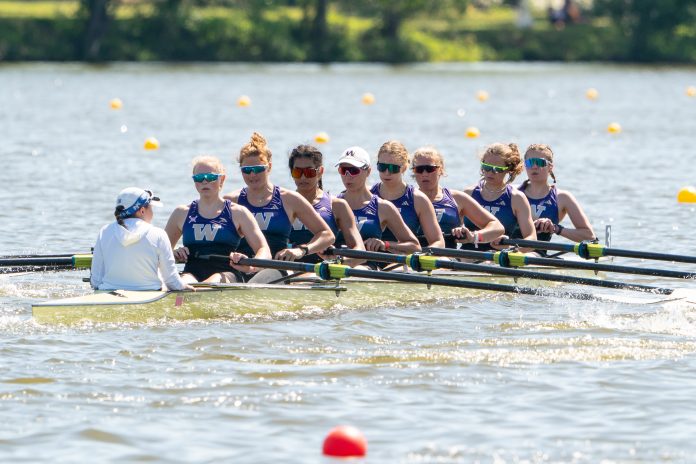To determine the top 25 collegiate crews in the United States, each team was assigned relative weights for competitive speed, and a proprietary formula produced an overall score for each program, with the top 25 published here.
To continue reading…
Register for free to get limited access to the best reporting available.
Free accounts can read one story a month without paying.
Or subscribe to get unlimited access to the best reporting available.
To learn about group subscriptions, click here.
Already a subscriber? Login
Right from the start, we know there will be howls of complaint about a university like Texas with a great NCAA women’s program not making the top 10 of the 2023 Rowing News Top 25 Overall College Programs. We can’t emphasize “overall” enough.
While the Longhorns finished a commendable fourth at the NCAAs—a result that would be the highlight of most rowing careers and included victory for the Texas varsity four—they didn’t score a single point in our overall ranking in the varsity heavyweight men’s, lightweight men’s, or lightweight women’s categories. Texas doesn’t have varsity programs in those three categories, although they certainly have the resources for it. That’s a choice.
Texas Crew, its club program, had some good results at the ACRA regatta, but those points weren’t enough to bring the overall score up to the level of universities that support more complete and nationally competitive rowing programs for men and women. The same is true of SMU this year and will likely be true in the years to come of many other universities that support only openweight women’s varsities.
The NCAA championships, which are for openweight women’s varsities only, are decided on team scores, while the other national championships are based on the individual varsity eights alone. The NCAA’s championship structure adds another complication to how we determine the ranking with its “automatic qualifiers” (the winners of 11 conference championships qualify automatically for the 22-school Division I field, and the remaining 11 spots are selected at large by a committee).
The result is that a program like Harvard/Radcliffe, fifth at this year’s Ivy League Championships, gets left out of the championship—and our previous ranking system—while slower, automatically qualified schools are in.
In this year’s system, we’ve added “fitting” to the process, awarding ranking points to NCAA Division I programs not invited to the championship, based on spring results against crews that were.
These rankings rely exclusively on demonstrated speed in 2,000-meter racing at season-culminating championships, with the exception of the aforementioned NCAA adjustments. They reflect the relative speed of the overall rowing programs at each college and not the quality of the experience for the student-athletes.
2. University of Washington
Even without lightweight programs for either men or women, Washington ranks second this year on the strength of second-place finishes at both the NCAA and IRA national championships. Both impressive performances came as surprises to outside observers, but not to women’s coach Yaz Farooq or men’s coach Michael Callahan. The Huskies staffs knew they had developing speed through the spring after taking their lumps in the early season—the men on a Canadian trip and the women at the San Diego Crew Classic. But when it mattered, they were faster than all but one and enter 2024 as favorites for both national championships.

